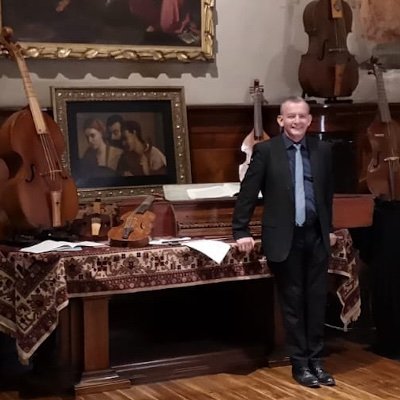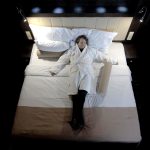José Vasquez died of complications from the novel coronavirus on March 4th, 2021. He was a viola da gamba player, early music specialist, founder of the Orpheon foundation, and an important instrument collector. He had just transferred his musical instrument collection to the castle in Bracciano, Italy, when he received his positive Covid-19 test.
Note: The purpose of the English-language section of the OperaPlus magazine is to bring news of the Czech music scene to the world. Our editors, however, noticed there was no article about Mr. Vasquez’s passing in English-language media and, since Ms. Vazquez had connection in the Czech Baroque music scene, decided to provide this article.
José Vasquez was born in 1951 in Havana, Cuba. His family left Cuba when he was a child. José lived in the United States for the next 13 years and began studying early music, there, earning a Bachelor’s degree in music from Northwestern University in Chicago. He subsequently studied Baroque violin and viola da gamba with Jaap Schroeder and Hannelore Müller at the Swiss Schola Cantorum in Basil, Switzerland.
He began teaching early music interpretation soon after his studies. From 1980, he taught at the Winterthur conservatory and, from 1982, at the university in Vienna.
As a performer, he collaborated with the Vienna philharmonic, Concertgebouw Chamber Orchestra in Amsterdam, the opera orchestra in Zurich, the chamber orchestra of Saltsburg, the Musica Antiqua Köln, Ex Tempore in Belgium, and other ensembles. He also collaborated with artists such as Riccardo Chailly, Roy Goodman, Florian Heyerick, Günter Jena, Helmut Rilling or Franz Welser-Möst.
Along with the Orpheon organization, he founded the Orpheon Baroque Orchestra and Orpheon Consort with which he made a number of recordings.
During his life, Vasquez received the Decoration of Honour for Services to the Republic of Austria.
As a musicologist and researcher, Vasquez collaborated with a number of international institutions such as the Metropolitan museum v New York, the Smithsonian Institute in Washington or Sotheby’s auction in London.
Vasquez’s most significant achievement was the creation of an extensive collection of original historical instruments, numbering in over 200 string instruments (violins, violas, violoncellos, viola da gambas, and other early string instruments) from the 16th to 18th centuries. He bought many of them in dismal condition and invested in their restoration.
Vazquez lent string instruments from his collection for short-term and long-term exhibition all over the world. A number of performers played on instruments borrowed from his collection.
Vasquez never stopped searching for a permanent space to house his exhibition of string instruments and serve as headquarters for an institute of historically informed interpretation and a workshop for the restoration of string instruments.
The last exhibition of his work took place at the Castello Orsini-Odescalchi castle in the city of Bracciano in the Lazio region of Italy, not far from Rome.
José Vasquez died on March 4th, 2021, after just having moved his instrument collection to Bracciano.
The editors of OperaPlus magazine express their condolences to Mr. Vazquez’s family and loved ones on behalf of the Czech Baroque music community. Mr. Vasquez taught at the Valtice early music school and festival and was thus part of the burgeoning Baroque music scene which grew in the Czech Republic after 1989. Czech luthiers Petr Vavrouš and Jan Stejskal were part of Mr. Vasquez’ instrument restoration team and Czech viola-da-gamba player Petr Wagner played on an instrument borrowed from his collection.




